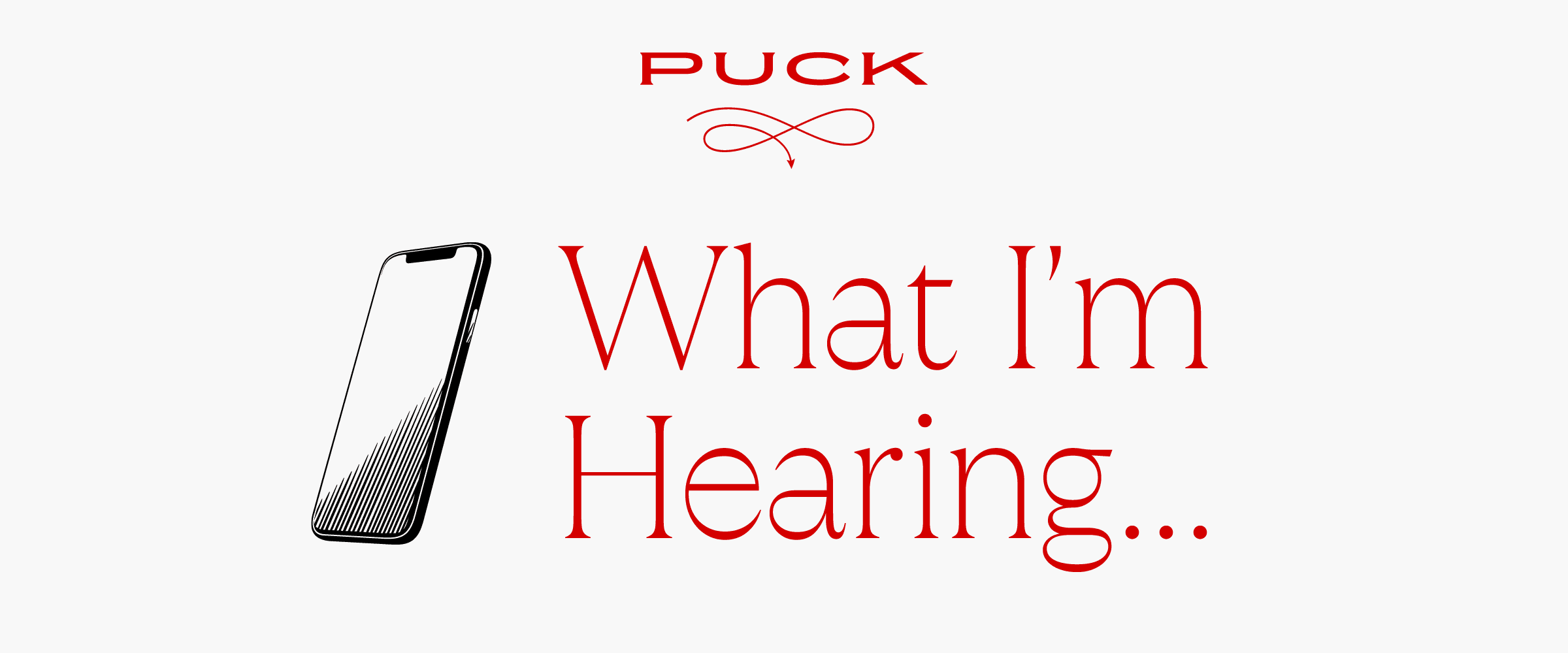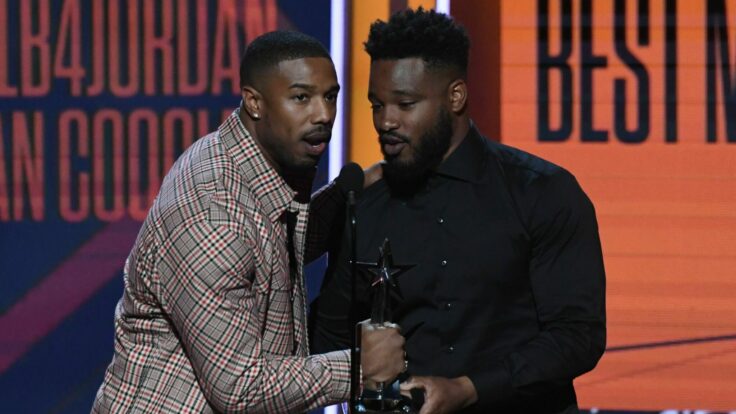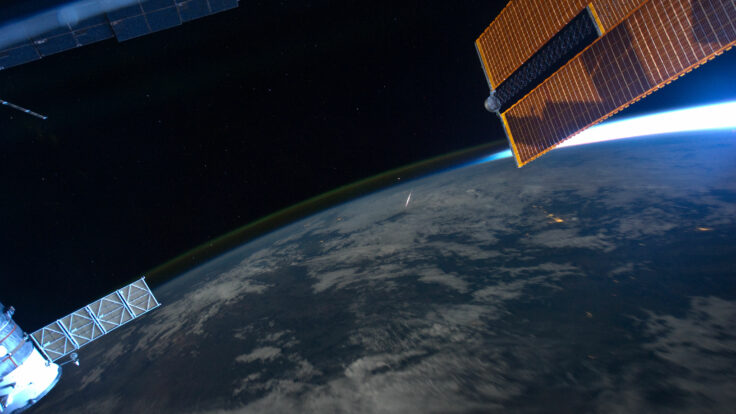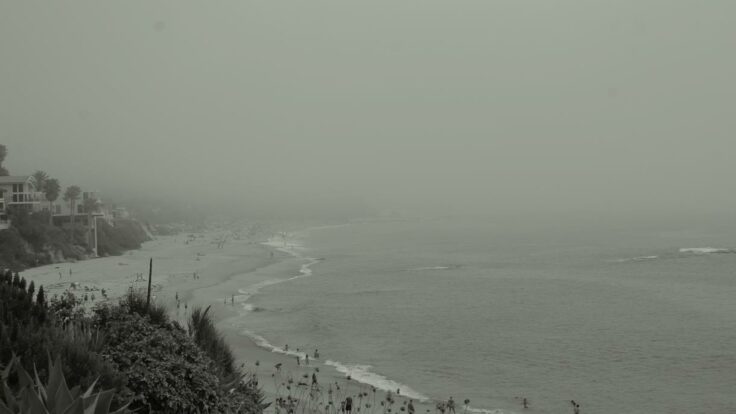 |
|
Welcome back to What I’m Hearing, where I’m marathoning awards movies while deciding on talent invites for our big Stories of the Season event. If you’ve got a screening (or a screener!) that I should see, please email me and I’ll do my best to watch.
P.S.A.: Eriq Gardner is off this week, so no What I’m Hearing+ tomorrow. WIH is back on Thursday as usual.
Programming note: On The Town, Lucas Shaw offered a new formula for calculating backend for streamers, Justine Bateman parsed the latest A.I. news (and depressed me), and Mark Duplass explained why he paid for Penelope, his new Netflix show, all by himself. Subscribe here and here.
Got a news tip or an idea for me? Just reply to this email or message me anonymously on Signal at 310-804-3198.
Discussed in this issue: Tony Vinciquerra, Brian Roberts, Jon Feltheimer, Jimmy Pitaro, Megan Ellison, MrBeast, John Malone, Tom Rothman, Gerry Butler, Halle Berry, Hoda Kotb, Joe Buck, Adam Fogelson, Donna Langley, Katy Perry, Adam Driver, Francis Ford Coppola, and… the worst neighbor in Hollywood.
But first…
|
| Who Won the Week: Ravi Ahuja |
|
| New studio head alert, make sure you send the Wally’s kiss-ass wine basket by the end of the week. The Sony Pictures C.O.O. and head of TV is taking over the C.E.O. job from Tony Vinciquerra, making Ahuja the latest low-profile TV executive to lead a sprawling media conglomerate. More below…
Runner-up: Chris Sanders. The Wild Robot writer-director’s $35 million opening delivered Universal/DreamWorks Animation the first original animated studio film to open above expectations since Covid reset the theatrical market for families.
Second runner-up: Jared Stacy and Jay Marine, Prime Video’s Thursday Night Football leads, who scored 17.6 million all-platform viewers for Thursday’s Cowboys-Giants matchup, a record for a streamed NFL regular season game, per Nielsen.
More: Maybe an honorable mention to Francis Ford Coppola’s tax accountant, who’s gonna have amazing losses to write off this year. Or Adam Driver’s new agents at WME, who’ve got a nice rebuild opportunity after his most recent six movies: The Last Duel, House of Gucci, White Noise, 65, Ferrari, and Megalopolis.
|
|
|
| A little more on the Sony shake-up…
“News flash: A studio head is choosing to step down voluntarily at age 70!” So read a text from an (older) producer when Sony Pictures announced today that Tony Vinciquerra, its C.E.O. for more than seven years, will give way to Ravi Ahuja, his 53-year-old television chairman and C.O.O., at the end of the year. Yes, it’s a win for anti-gerontocracy activists such as myself, but it’s also another sign that TV executives now rule Hollywood. Look around town: There isn’t a single top studio or streamer exec who rose through the film ranks, with the exception of Donna Langley, recently promoted to chair of the studio group and chief content officer at NBCUniversal after running movies for years. And her boss is Mike Cavanagh, a career cable and financial services executive.
Vinciquerra didn’t really telegraph his exit externally, but one source in his inner circle wasn’t surprised at all by the news. Tony groomed Ravi, and the handoff has been planned for a while, I’m told. Hence the drama-free news rollout and the round of brief, on-message media interviews today. Unlike the succession dramas elsewhere, this will probably be a one-day story.
Vinciquerra gets credit for stabilizing Sony’s L.A. operation after the devastating hack under Michael Lynton, as well as resisting the peer pressure to plunge Sony into the streaming wars, even if that move all but guaranteed that the company will not become a global distribution power. Sony never came close to winning the top Oscar in the Vinciquerra era, and it’s still the only major studio that has never made a billion-dollar-grossing movie (the recent Spider-Man entries and 2012’s Skyfall came from Disney and MGM/Eon, respectively). But financially, the film studio is doing fine under Tom Rothman, who has generated decent B-level franchises (Bad Boys, Ghostbusters, Spider-Man villains) out of D-level I.P. And its lucrative 2021 Netflix output deal guarantees consistent cash and streaming currency to attract talent. Now, Ahuja will just need to figure out how to grow the TV side as a pure seller, not a buyer.
|
| Quote of the Week (John Malone edition) |
|
“No. It’s a terrible business.”
—John Malone, the Liberty Global mogul and Warner Bros. Discovery board member, when asked by a MoffettNathanson analyst whether direct-to-consumer streaming is a good business.
Runner-up: “If you give Big Tech the opportunity for free access to stream on the internet live events of massive demand, who’s going to be able to outbid them for sports content?”—Malone, blaming Net Neutrality and lack of antitrust scrutiny for the inability of content companies to compete for sports rights. Of course, Malone’s cable bundles—and the fact that only about 30 percent of subscribers regularly watch sports yet all of them have been forced to pay for sports—inflated rights fees for decades.
“There shouldn’t have been a Netflix.”
—Malone again, lamenting that the linear TV business didn’t simply add on-demand and searchability functions to its offerings, as well as à la carte channels and smaller bundles. (Again, Malone’s businesses either resisted or failed to implement the kind of disruption that Netflix accomplished.)
A little more on this…
In the analysts’ summary of Malone, “the curse” of the current transition from linear to digital “has been the inability of the content industry to deal with the distribution industry and come up with win-win solutions.” That’s true—if the big cable network owners had partnered with the MVPDs on streaming offerings seven to 10 years ago, rather than trying to build their own Netflix killers, maybe those with the actual expertise in selling video packages could have better competed in, uh, selling video packages. But that didn’t happen, and now Malone’s Charter C.E.O. Chris Winfrey is trying to salvage the still-profitable business by doing deals that add services like Disney+ and Max to its Spectrum bundles, rather than working to shed channels and offer skinnier bundles and even à la carte services that customers want.
Will it work? Malone says that a combo of direct-to-consumer and bundled services (albeit the ad tiers) is the key to managing the transition to digital, especially internationally, and that his companies are well-positioned on that front. Wall Street clearly disagrees, given the share price of Warner Discovery, in particular. And now with DirecTV and Dish agreeing to merge, both Charter and the Warner Discovery networks will have a more formidable player in the space to deal with, one with a strategy that looks different from Malone’s.
|
|
|
| As the third quarter ends, domestic box office is now down 26 percent compared with pre-pandemic averages, and down 12.2 percent compared with last year. But Joker 2! Let’s see… [FranchiseRe]
Warner Discovery, which is definitely not desperate and scrambling, has accumulated quite the pile of lawsuits lately: the NBA, the Venu streaming service, and now Comcast is claiming rights to four shows, including the Harry Potter reboot. [WSJ]
Related: Malone also took a swipe at the NBA deal signed by Comcast’s Brian Roberts, who outbid WBD: “Huge money for 11 years into an uncertain future at an escalating price.”
MrBeast’s embattled Amazon reality show has a “Fyre Fest” vibe to it. [Rolling Stone]
Megan Ellison’s Annapurna Interactive imploded after employee infighting and a Vegas dinner gone very awry. [Bloomberg]
Katy Perry’s 143, a comprehensive instruction manual on how not to launch a pop star comeback, failed to debut in the top five on the Billboard 200. [Consequence]
Honestly, the media outrage around the ongoing ESPN layoffs is kinda perplexing. ESPN is now a sports rights business, and that business is hugely expensive and challenged. That’s it. Nothing matters to Disney’s carriage fees, ad sales, and streaming growth except the eyeballs that come from live games. It still needs to employ certain top broadcasters to keep the sports leagues happy (Joe Buck and Troy Aikman calling Monday Night Football) and a few rage-bait commentators still matter (Stephen A. Smith is negotiating a huge new deal) and I guess someone needs to host SportsCenter. But beyond that? Everyone’s expendable, and none of the recently deposed talent—Jeff Van Gundy, Sam Ponder, Suzy Kolber, Robert Griffin III, and now Zach Lowe—actually matter to those league relationships.
Did Lowe elevate the NBA? Yes, but elevation is not the goal for Jimmy Pitaro at ESPN. Survival is the goal in an ecosystem where NBA rights cost $2.6 billion a year, nearly double the current deal, and for fewer games. The real question is how long the entire journalistic enterprise at ESPN will continue. Fox Sports basically gutted its real reporters and editors years ago, and that business is fine. [House of Strauss]
Speaking of new realities, Hoda Kotb decided to leave Today after NBC proposed a pay cut, Dylan Byers reports. [Puck]
Hollywood metaphor alert: Rich guy’s son turned movie producer John Powers Middleton let his mansion on Mulholland be overtaken by graffiti and squatters. [LA Times]
And now Scott Mendelson on the Mega-flop of the year, and Lionsgate’s horrendous run in theaters…
|
|
|
| There was no reason to expect Francis Ford Coppola’s Megalopolis to perform any better than it did this past weekend, when the $120 million-budgeted, self-financed sci-fi opus opened to a paltry $4 million domestic in 1,854 theaters. The film had received head-scratching reviews at Cannes, despite a lengthy standing ovation that was obviously a nod to the 85-year-old director’s legacy and not what everyone had just seen. Coppola’s last unmitigated commercial success was Bram Stoker’s Dracula ($216 million on a $40 million budget) in November 1992. When all the big Hollywood studios passed on the distribution rights to Megalopolis, Lionsgate stepped up in a deal mainly about continuing an ongoing (mostly home video) relationship with the director.
After Megalopolis tanked, Lionsgate chairman Adam Fogelson praised Coppola and insisted that, “like all true art,” Megalopolis “will be viewed and judged by movie audiences over time.” Left unsaid, of course, was not just that Coppola’s passion project had bombed, but also that its $4 million debut was par for the course for recent Lionsgate films. Since early August, Lionsgate has released a remarkable string of six theatrical flops in a row—beginning with Borderlands in August and continuing through the $50 million-budgeted remake of The Crow, the L.A. Riots-set crime drama 1992, the Dave Bautista-led action-comedy The Killer’s Game, the Halle Berry postapocalyptic drama Never Let Go, and now Megalopolis.
That’s a perilous drop from last year’s triple-whammy of franchise plays John Wick: Chapter 4, Saw X, and The Hunger Games: The Ballad of Songbirds and Snakes. Those films scored alongside possible new small-scale franchises like the Gerard Butler/Mike Colter actioner Plane, all of which softened the commercial underperformance of, for example, Kelly Fremon Craig’s much-liked adaptation of Judy Blume’s Are You There God? It’s Me Margaret.
Indeed, since Borderlands, Eli Roth’s $115 million video game adaptation that grossed just $33 million worldwide, the Lionsgate theatrical slate has earned a combined $42 million in North America—less than the $44 million opening weekend of last November’s Hunger Games prequel. To date, Lionsgate’s 2024 films have earned just…
Continue reading online…
|
|
|
| Instead of running complaints about Netflix in response to my Thursday column on the pushback to its shift to performance-based pay, I’ll share an interesting (and Netflix-related) insight from a reader in academia…
“YouTubers are windowing. I recently observed that the Dude Perfect guys have been pushing [fans to] their recently launched app to view their videos there, and also collecting other YouTubers (Mark Rober, that magician dude) to window their videos on the app.
Smart move if they can reach scale, but in conjunction with your article it got me thinking about the convergence of YouTube-like talent and Hollywood. Not in the same way that has been attempted before, where YouTubers attempt to make themselves into Hollywood talent. But where streamers act as a window and distributor of the YouTubers.
- Netflix (even more so Amazon) can instantly juice their ad business with content where the creators are used to ad-supported revenue and no financing up front.
- Aligns with the Netflix goal you outlined to pay for performance, but with the added benefit of circumventing the Hollywood apparatus. A flex move for sure.
- It can be a separate tile/portal/landing page in the app, “NetTube,” so it doesn’t co-mingle with the highly produced content. But it keeps you from jumping apps.
- NetTube doesn’t need to open up the floodgates. There are enough marquee YouTubers now to create scale without all the other BS on YouTube (i.e., what the Dude Perfect guys are doing).
- Netflix gets to eat some of YouTube’s lunch, whereas YouTube will never be able to do the inverse.
- YouTubers get more diversification and distribution to sell lunch packs [and other merch.] YouTube doesn’t have exclusivity, its perk is scale and a great ads business.
|
| If Netflix is all-in on the ad business, why not go after the holy grail. They can be CBS and YouTube at the same time, with very little effort.” |
|
|
Have a great week,
Matt
Got a question, comment, complaint, or a Mulholland mansion you’d like me to squat in? Email me at Matt@puck.news or call/text me at 310-804-3198.
|
|
|
|
| FOUR STORIES WE’RE TALKING ABOUT |
 |
| Hoda’s Pay Cut |
| Inside Hoda Kotb’s departure from NBC’s ‘Today’ show. |
| DYLAN BYERS |
|
 |
|
 |
|
 |
| Final Days of FTX |
| Digging into the latest gruesome FTX financial autopsy. |
| WILLIAM D. COHAN |
|
|
|
|
|
 |
|
|
|
Need help? Review our FAQs
page or contact
us for assistance. For brand partnerships, email ads@puck.news.
|
|
You received this email because you signed up to receive emails from Puck, or as part of your Puck account associated with . To stop receiving this newsletter and/or manage all your email preferences, click here.
|
|
Puck is published by Heat Media LLC. 227 W 17th St New York, NY 10011.
|
|
|
|














